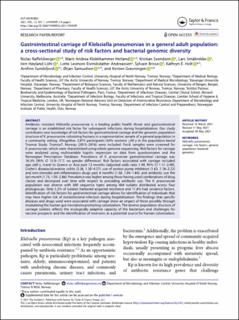| dc.contributor.author | Raffelsberger, Niclas Peter | |
| dc.contributor.author | Hetland, Marit Andrea Klokkhammer | |
| dc.contributor.author | Svendsen, Kristian | |
| dc.contributor.author | Småbrekke, Lars | |
| dc.contributor.author | Löhr, Iren Høyland | |
| dc.contributor.author | Andreassen, Lotte | |
| dc.contributor.author | Brisse, Sylvain | |
| dc.contributor.author | Holt, Kathryn E. | |
| dc.contributor.author | Sundsfjord, Arnfinn | |
| dc.contributor.author | Samuelsen, Ørjan | |
| dc.contributor.author | Gravningen, Kirsten Midttun | |
| dc.date.accessioned | 2021-09-02T09:36:04Z | |
| dc.date.available | 2021-09-02T09:36:04Z | |
| dc.date.created | 2021-07-20T13:50:31Z | |
| dc.date.issued | 2021 | |
| dc.identifier.issn | 1949-0976 | |
| dc.identifier.uri | https://hdl.handle.net/11250/2772504 | |
| dc.description.abstract | Antibiotic resistant Klebsiella pneumoniae is a leading public health threat and gastrointestinal carriage is an established risk factor for subsequent infections during hospitalization. Our study contributes new knowledge of risk factors for gastrointestinal carriage and the genomic population structure of K. pneumoniae colonizing humans in a representative sample of a general population in a community setting. Altogether, 2,975 participants (54% women) >40 y in the population-based Tromsø Study: Tromsø7, Norway (2015–2016) were included. Fecal samples were screened for K. pneumoniae, which were characterized using whole-genome sequencing. Risk factors for carriage were analyzed using multivariable logistic regression on data from questionnaires and the Norwegian Prescription Database. Prevalence of K. pneumoniae gastrointestinal carriage was 16.3% (95% CI 15.0–17.7, no gender difference). Risk factors associated with carriage included age ≥60 y, travel to Greece or Asia past 12 months (adjusted odds ratio 1.49, 95% CI 1.11–2.00), Crohn’s disease/ulcerative colitis (2.26, 1.20–4.27), use of proton pump inhibitors (1.62, 1.18–2.22) and non-steroidal anti-inflammatory drugs past 6 months (1.38, 1.04–1.84), and antibiotic use the last month (1.73, 1.05–2.86). Prevalence was higher among those having used combinations of drug classes and decreased over time with respect to preceding antibiotic use. The K. pneumoniae population was diverse with 300 sequence types among 484 isolates distributed across four phylogroups. Only 5.2% of isolates harbored acquired resistance and 11.6% had virulence factors. Identification of risk factors for gastrointestinal carriage allows for identification of individuals that may have higher risk of extraintestinal infection during hospitalization. The findings that specific diseases and drugs used were associated with carriage show an impact of these possibly through modulating the human gut microbiota promoting colonization. The diverse population structure of carriage isolates reflects the ecologically adaptive capacity of the bacterium and challenges for vaccine prospects and the identification of reservoirs as a potential source for human colonization. | en_US |
| dc.language.iso | eng | en_US |
| dc.publisher | Taylor and Francis | en_US |
| dc.rights | Navngivelse 4.0 Internasjonal | * |
| dc.rights.uri | http://creativecommons.org/licenses/by/4.0/deed.no | * |
| dc.title | Gastrointestinal carriage of Klebsiella pneumoniae in a general adult population: a cross-sectional study of risk factors and bacterial genomic diversity | en_US |
| dc.type | Journal article | en_US |
| dc.type | Peer reviewed | en_US |
| dc.description.version | publishedVersion | en_US |
| dc.rights.holder | Copyright 2021 The Author(s) | en_US |
| dc.source.articlenumber | 1939599 | en_US |
| cristin.ispublished | true | |
| cristin.fulltext | original | |
| cristin.qualitycode | 1 | |
| dc.identifier.doi | 10.1080/19490976.2021.1939599 | |
| dc.identifier.cristin | 1922251 | |
| dc.source.journal | Gut Microbes | en_US |
| dc.identifier.citation | Gut Microbes. 2021, 13 (1), 1939599. | en_US |
| dc.source.volume | 13 | en_US |
| dc.source.issue | 1 | en_US |

